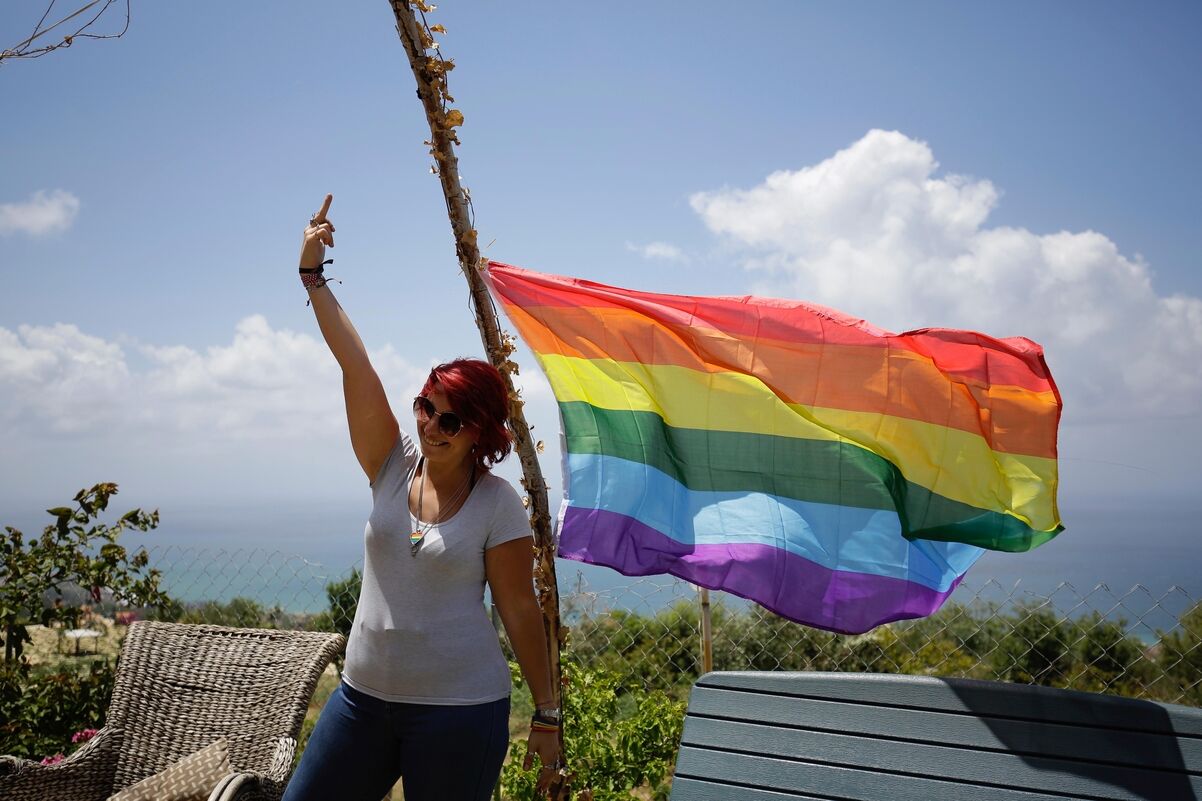LGBTQ activists have a message for authorities in Lebanon after police forced the shutdown of Beirut’s second Pride celebration: You can’t stop a movement.
Law enforcement officials apprehended Beirut Pride organizer Hadi Damien after the planned nine-day festival kicked off with a Sunday brunch for supportive parents of queer or trans individuals and a staged reading on Monday of a play about anti-LGBTQ hate crimes.
Officers from the General Directorate of General Security, a Lebanese intelligence agency, told Damien the reading wasn’t approved by censors.
Damien would subsequently be taken to the Hobeich police station, where the BBC reports he was detained overnight on a charge of “encouraging debauchery and offending public decency.” During interrogation, officials with the country’s vice squad allegedly pressured him to cancel the rest of the Pride programming, threatened with up to two years in prison if he did not comply.
“I advised him to sign,” his lawyer, Layal Saqr, tells the Associated Press. “We want him outside, not behind bars.”
The organizer says he complied with the demand to cancel Pride in order to prevent an Egypt-like crackdown in Lebanon. More than 85 people were arrested in Egypt after fans of the queer-fronted Lebanese rock group hoisted a rainbow Pride flag at its September concert in Cairo.
The display of solidarity led to a virulent backlash against queer and trans individuals, as police rounded up people suspected to be LGBTQ after tracking their Facebook posts and raiding gay-friendly cafes.
“I didn’t want to cause panic or disappoint the LGBTQ community,” Damien says in the AP interview.
This week’s events would have included street fairs, drag shows, poetry readings, music performances, and workshops on protecting one’s rights as a queer or trans person. Currently, homosexuality is illegal in the Middle Eastern country under Article 534 of the Lebanese Penal Code, which prohibits “all sexual intercourses which contradict the laws of nature.”
If found guilty of violating that statute, offenders face up to a year in prison and a fine of one million Lebanese pounds (which comes out to $660 in U.S. dollars).
Human rights organizations condemn the shutdown of Beirut Pride as a “blatant case of state harassment.” In a press release, the global advocacy group Amnesty International affirms its belief that “LGBTQ rights are human rights” and that laws criminalizing same-sex behavior are a “sham.”
“We stand in solidarity with all those affected by the cancellation of Beirut Pride Week,” says Middle East Research Director Lynn Maalouf.
But local LGBTQ activists stress that the targeting of Beirut Pride has no impact on wider programming for the queer and trans community. As the world celebrated the International Day Against Homophobia, Transphobia and Biphobia (IDAHOTB) this week, advocates will be holding events around the city.
Georges Azzi, executive director of the Arab Foundation for Freedoms and Equality (AFE), clarifies in a statement that IDAHOTB programming has been taking place independently of Pride since 2005.
Azzi adds that with the little interference against those events, the attacks against Pride were surprising.
“The public discourse is very welcoming now and this is why what happened with the Pride events this year came as a surprise for us, and we want to understand where it came from, but at the same time we don’t want people to think there is a crisis in Lebanon,” he claims.
“There is no crisis,” Azzi continues. “This incident happened, but the country is not in a crisis.”
Even despite this week’s setbacks, activists say there has been considerable progress for Lebanon’s LGBTQ movement in recent years. A series of favorable court rulings in recent years have challenged Article 534, beginning with a 2014 court case finding that intercourse between a trans woman and cisgender man cannot be deemed “unnatural.”
Last year a judge in the Metn court claimed that “homosexuals have the right to have human or intimate relationships with any people they chose, without discrimination on the basis of their sexual orientation.”
Azzi claims that as the Lebanese court system increasingly rules in favor of LGBTQ rights, public opinion is trending toward support for equality. A recent poll found that nearly two-thirds of the country’s population (65 percent) believed the anti-gay penal code should be struck down, he says.
Meanwhile, nine in 10 Lebanese people oppose violence against members of the LGBTQ community.
This is the second year that activism in Lebanon has continued to flourish even as Pride celebrations are challenged. In 2017, local Islamist groups threatened to attack a parade scheduled to be held in Beirut, which would have been the first of its kind in a majority Arab country. But the event was canceled due to safety concerns.
Advocates vowed to continue to support LGBTQ organizing as queer and trans activists look ahead to the future.
“Lebanon is a leader when it comes to LGBTQ organizing and visibility in the Middle East and North Africa region,” says Outright International Executive Director Jessica Stern in a statement. “Authorities should respect the right of the LGBTQ community’s freedom of speech and assembly.”
“Through their perseverance, activists in Lebanon have achieved incredible and inspiring progress,” she adds.
photo by IBRAHIM CHALHOUB/AFP/Getty Images
Don't forget to share:
Help make sure LGBTQ+ stories are being told...
We can't rely on mainstream media to tell our stories. That's why we don't lock our articles behind a paywall. Will you support our mission with a contribution today?
Cancel anytime · Proudly LGBTQ+ owned and operated
Read More in Impact
The Latest on INTO
Subscribe to get a twice-weekly dose of queer news, updates, and insights from the INTO team.
in Your Inbox













